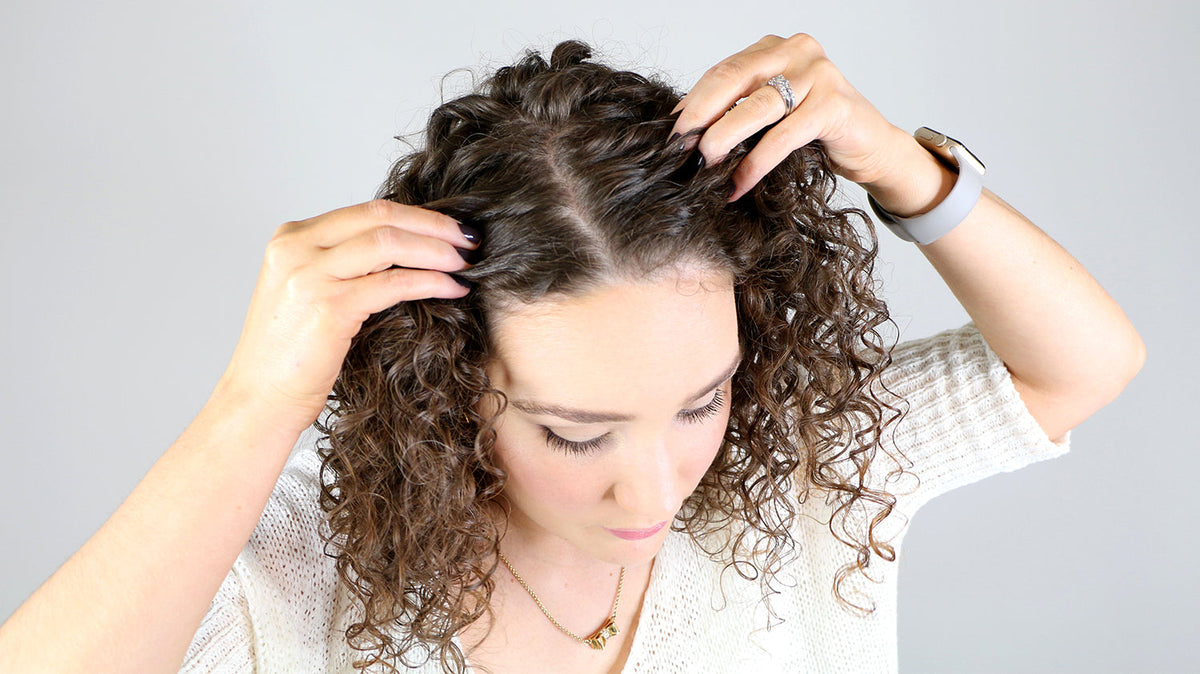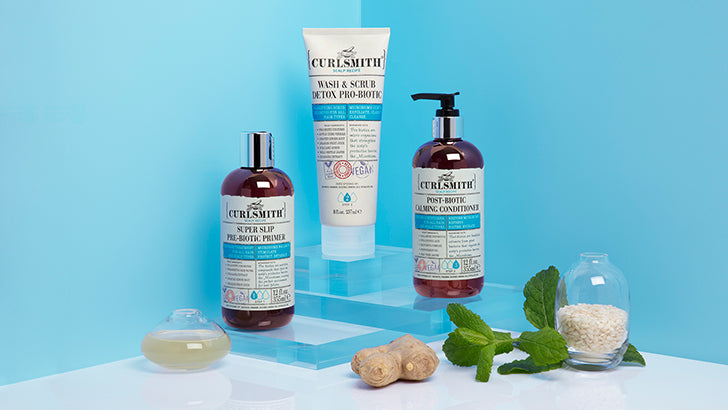
Itchy scalps can be frustrating and uncomfortable to deal with. There are many symptoms and causes of itchy scalp out guide covers, and tips on how to take care of your scalp. Find out how to treat an itchy scalp and how to prevent it from happening.
Table of Contents:
- What is an Itchy Scalp?
- Symptoms of an Itchy Scalp
- 7 Causes of Itchy Scalp
- Home Remedies to Soothe an Itchy Scalp
- When to See A Medical Professional
- 4 Expert Tips to Prevent Itchy Scalps
What is an Itchy Scalp?
Our scalp is skin just like the rest of our body, but its characteristics are unique. Your scalp contains more hair follicles, more sebaceous glands, and a specific microbiome. This means, that no matter your curly hair type, the scalp may be more susceptible to certain dermatological problems than other areas of the skin. One of these problems may be an itchy scalp, and you may require scalp treatments to help improve its health.
Just one square centimeter of our scalp can be inhabited by up to one billion microorganisms, including bacteria, fungi, and viruses, making the microbiome complex. An individual’s unique pH, temperature, moisture, and sebum content can affect the scalp's microbiome. External factors such as the environment, lifestyle, and cosmetic use may also contribute. That’s why you should use scalp-specific product recipes to keep the microbiome balanced.
Scalp Pruritus
Scalp pruritus is the medical term for “itchy scalp” and can be challenging to diagnose because sometimes there is no visible evidence of irritation on the scalp. “Pruritus,” also known as itch, is an unpleasant sensation that evokes a desire to scratch. One study found that it is a common condition, with 25% of participants reporting an itchy scalp.
Symptoms of an Itchy Scalp
An itchy scalp is a symptom in itself of underlying conditions such as seborrheic dermatitis, dandruff, contact dermatitis, scalp psoriasis, and more. Scalp itch can be accompanied by redness, lesions, or flakes on the scalp, or there could be no visible signs of irritation.
The itching sensation is often described as:
- Prickling
- Tightness
- Burning
- Pain.
Itchiness can also become worse with touching the scalp or hair. Factors in the skin such as histamine, sensory receptors, and nerve fibers contribute to itchiness at the scalp.
7 Causes of Itchy Scalp
You may be wondering ‘why is my scalp itchy?’ and the answer may not be as simple as one cause.
There can be multiple reasons why you have an itchy scalp, including:
- Dandruff
- Dry scalp
- Psoriasis
- Contact dermatitis
- Atopic dermatitis
- The wrong hair products
- Seborrheic dermatitis

1. Dandruff
Dandruff is a mild form of seborrheic dermatitis that occurs on the scalp. Research has shown that alterations in the bacterial microbiome play a role in dandruff formation due to an imbalance between bacterial or fungal species.
Common symptoms of dandruff include flakes, itchiness, tightness, or a burning sensation on the scalp. Some shampoos may target dandruff's causes and help clear them from the head.
2. Dry Scalp
Dry scalp also causes itchiness and has similar characteristics to dandruff but is caused by the lack of sebum, the scalp’s natural barrier, and moisturizer. Overwashing the hair and using shampoos with harsh sulfate ingredients can strip the hair of its natural oils, causing dryness.
Weather changes can trigger dry scalp, specifically in dry climates where there is a lack of humidity. Symptoms of dry scalp include itchiness, flakes, and a tight feeling at the scalp. Eczema is another dry skin condition that can cause an itchy scalp, often triggered by harsh shampoos, stress, and dry weather.
3. Psoriasis
Another common cause of scalp itch is psoriasis, an immune-mediated disease that causes inflammation in the body. Visible signs include raised plaques and scales on the skin, commonly found on the scalp, elbows, and knees.
Normal skin sheds off after about a month, but with psoriasis, the skin cells shed after three to four days and accumulate on the skin’s surface. Plaques can appear on the scalp, hairline, forehead, back of the neck, and around the ears. In addition to plaques, symptoms include itchy scalp, scaling, and flakes on the skin.
4. Contact Dermatitis
Contact dermatitis is another common cause of scalp itch and occurs as a result of allergens such as fragrances and preservatives found in hair products.
Hair dye is another common sensitizer along with detergents in shampoos. Symptoms include itchiness, dry scalp, burning, and redness. Using fragrance-free hair products may be a good idea if you have these symptoms.
5. Atopic dermatitis
Atopic dermatitis also referred to as sensitive scalp, is similar to contact dermatitis in that it’s triggered by irritants found in products. Symptoms of a sensitive scalp include itching, burning, tingling, or prickling when exposed to external or hormonal factors.
An altered skin barrier predisposes the scalp to sensitization. Those with sensitive skin and other areas of the body, such as the face commonly experience sensitive scalp as well.
6. Hair products
Hair products can also often be the culprit of an itchy scalp, even for those who do not have a sensitive scalp. Some gels can cause flakes on the hair that can end up on the scalp and cause itchiness. Mousses, hair sprays, and dry shampoos that contain denatured alcohol can dry out the scalp and hair.
Unless a product is designed to be used on the scalp, you should avoid applying hair products directly on your scalp. Techniques such as scrunching and “plopping” the hair on top of the head in a hair towel can cause products to end up on the scalp. Without proper cleansing, products can build up on the scalp over time, contributing to itchiness, flakes, and clogged hair follicles. It’s important to use scalp-safe hair products that are formulated with skin and hair-friendly ingredients.
7. Seborrheic dermatitis
The most common cause of itchy scalp is seborrheic dermatitis, an inflammatory skin condition that occurs in areas of the skin with many sebaceous glands. This condition results from interactions among the scalp skin, sebum, Malassezia fungi, and the cutaneous immune system.
Home Remedies to Soothe an Itchy Scalp
Maintaining a healthy scalp is essential to healthy hair and preventing scalp conditions from developing. Removing and preventing the build-up of products and oils on the scalp will keep it clear and foster an environment for healthy hair growth. Having a balanced microbiome and protective skin barrier will prevent inflammation and scalp itch.
Curlsmith’s Detox Kit
Curlsmith’s Scalp Recipes are specifically formulated to reduce built-up products and soothe the scalp. If you suffer from flaky, dry, or itchy scalp, our Detox Kit is particularly beneficial no matter your hair type. Just like all Cursmith products, they are free of sulfates, parabens, silicones, mineral oils, phthalates, and DEA.
Traditional clarifying shampoos can dry and strip the hair from its natural moisture, so the Curlsmith Detox Kit is a three-step system to protect the hair, clarify, and restore moisture.

How to use:
- Super Slip Pre-Wash Primer is the first step in the kit that creates a shield around the hair to protect the hair’s moisture and help you detangle to prevent breakage. It contains fermented rice water, known for its detangling and fortifying properties.
- Wash & Scrub Detox Shampoo is the second step and is a foaming shampoo that contains microbeads that help exfoliate the scalp, and loosen build-up, dirt, and dry skin. It also contains apple cider vinegar that helps melt away build-up and add shine.
The final step is the Post Wash Calming Conditioner which soothes and refreshes the scalp with a tingly sensation while rebalancing the pH and moisture levels. It contains peppermint and tea tree essential oils, which are great anti-inflammatory agents.
The Detox Kit is suitable to use every 4-5 washes to help maintain a healthy scalp.
Apple Cider Vinegar
Using apple cider vinegar on your scalp can help to remove product buildup, balance your scalp’s pH level, encourage stronger hair and help to control bacteria or fungi on the scalp. You should never apply apple cider vinegar straight to your scalp, as this can cause more irritation or itch.
If you choose to use it, you should dilute it with water to make a hair rinse to apply as a pre-shampoo treatment, a final rinse after your shampoo, or apply and leave it overnight before cleansing.
Coconut Oil
Coconut oil can help to seal moisture into your curls, but it may also offer antifungal or antibacterial properties to help combat an itchy scalp. The hydrating properties of coconut oil can help relieve itchiness.
Coconut oil can be especially useful to use to delouse and soothe itchiness from head lice. To apply coconut oil, start with 1 or two tablespoons and gently rub into your scalp.
Tea Tree Oil
Tea tree oil is an essential oil with antibacterial properties, helping you relieve flaky or itchy scalp. It can help to soothe and enhance your scalp health, helping to reduce inflammation. Add a few drops to a gentle shampoo and massage on your scalp.
When to See A Medical Professional
Treatment for an itchy scalp varies depending on the cause. If you’re experiencing any of these symptoms and have severe discomfort, consult with a dermatologist who can accurately diagnose your condition.
Many conditions that cause scalp itch can be treated at home and with over-the-counter remedies. However, scalp psoriasis may require medicated shampoo or prescription medication. Those with contact dermatitis should eliminate one product from their routine at a time that contains common allergens such as fragrance and preservatives until symptoms improve to determine the culprit.
Dandruff, contact and atopic dermatitis, and dry scalp can be treated with over-the-counter shampoos and the best treatments for dry scalp.
4 Expert Tips to Prevent Itchy Scalps
Preventing itchy scalp isn’t as difficult as you may think. Here are some top tips for preventing an itchy scalp:
- Using our Detox Kit on a regular basis - Keeping your microbiome balance is the first step to achieving a healthy scalp. Using our Detox Kit alongside scalp treatments can help you achieve this.
- Avoid harsh sulfates - Switching to a sulfate-free shampoo can help prevent the scalp’s microbiome and moisture balance disruption. Sulfates can strip the scalp, causing dryness, so the scalp overproduces sebum. Excessive sebum and dead skin cell build-up can cause dandruff and other itchy scalp conditions.
- Avoid ingredients that can build up - Some ingredients, such as silicones, heavy oils, and hair butter, can build up if you’re only using a mild cleanser. You need to remove scalp buildup in order to support your scalp health. Curlsmith’s styling products have lightweight formulas to prevent build-up.
Use a shampoo brush - Scalp massaging shampoo brushes can help loosen dead skin and product build-up when cleansing. Ensure you are thoroughly rinsing out conditioners, and massaging the scalp to ensure no residue is left. Avoid ‘plopping’, which can press hair products onto the scalp. Never sleep with wet hair, air dry or diffuse your hair instead, as wet hair can foster bacteria growth, leading to an itchy scalp.

Fortunately, itchy scalp can often be treated and prevented at home with proper care. If you’re experiencing severe discomfort or have been unable to get rid of an itchy scalp at home, seek advice from your doctor or dermatologist.
Curly Hair Care from Curlsmith
At Curlsmith, we create vegan hair products to help you love the curls you have. From curl creams to wavy hair products, you can enhance your hair routine. Take our curl quiz to identify your curl type and find product recommendations.